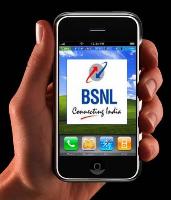|
| Help | |
| You are here: Rediff Home » India » Business » Pix |
|
 It is not clear how much money the government was hoping Bharat Sanchar Nigam Ltd, the public sector telecom firm, would raise from its initial public offering of shares.
It is not clear how much money the government was hoping Bharat Sanchar Nigam Ltd, the public sector telecom firm, would raise from its initial public offering of shares.
Whatever the figure, it is obvious that the IPO will now have to be put on the backburner, after the company's disastrous results.
The estimates are that when the company finally declares its accounts for 2008-09, it will be left with a profit of a few hundred crore rupees, down from over Rs 3,000 crore (Rs 30 billion) in the previous year (and that was less than half that in the year before).
For the last two years, the company would have been in the red if it had not earned interest income of around Rs 4,000 crore (Rs 40 billion).
In March 2006, the company had 65 million customers, compared to Bharti's 20.9 million and, at Rs 40,177 crore (Rs 401.77 billion) to Bharti's Rs 11,664 crore (Rs 116.64 billion), its revenues were also more than three times as high. Even as late as March 2008, it had a lead (72.3 million versus 64.3 million in terms of number of subscribers and Rs 38,053 crore or Rs 380.53 billion versus Rs 27,025 crore or Rs 270.25 billion. In 2009, however, Bharti's subscriber base and revenues shot up by a half; BSNL's subscribers rose 13 per cent while revenues fell 8 per cent.
Some of the decline might be explained as the lethargy of a state-owned enterprise. While one-two million customers surrendered their fixed land phones each year over the last few years, BSNL did nothing to stop the trend -- complimentary broadband connections could have been an obvious experiment.
But the real blame has to be heaped elsewhere, on the politician-bureaucratic clique that runs BSNL. Look at the number of subscriber additions and it is obvious that till around early 2007, BSNL was getting roughly the same number of new mobile customers as Bharti.
It is after that, when BSNL floated a tender for 45 million mobile lines, that its troubles began. The minister, A Raja, decided the price that BSNL had got through a global bid was too high and needed to be reduced.
This delayed the process by many months and, after ordering some more 2G lines instead of 3G ones in the initial period, BSNL's vendors reduced the price -- by which time, the minister had also reduced the size of the order by around half. And now, when BSNL is ready to order again, one of the vendors it rejected on technical grounds has gone to court protesting the decision.
If the government is at all keen that the company function competitively, it needs to do something about this kind of non-decision making. If even routine decisions of the company are to be held to ransom by the political class, it is going to go downhill fast. Equally, while a transparent public bid is an important thing, if the company's expansion can be brought to a halt, the entire process needs to be rethought -- when was the last time you heard a losing vendor taking Bharti to court?
Or some method put into place to ensure speedy trial. Either way, the ball is in the government's court.
| © 2009 Rediff.com India Limited. All Rights Reserved. Disclaimer | Feedback |
